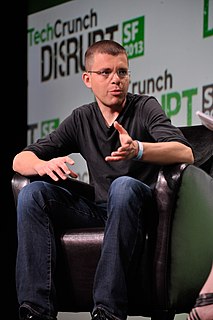A Quote by Marc Andreessen
You go on Facebook, you buy social advertising. And you can very cost-effectively target people who are in the market for your product from all over the world.
Related Quotes
It doesn't matter if you have the greatest product in the world if no one will buy it. Have an idea of where your customers will come from and how to get to them. Partner with blogs and magazines that target that audience. If you partner with them, hopefully you won't have to spend money on advertising.
Facebook, when it began, like Google, was very resistant to advertising. They knew, like all - Mark Zuckerberg, like all good engineers, knew that advertising makes the product worse. But, you know, over time, they've been forced to increase the advertising load more and more and more. And the way they advertise is they - it's subtle but they know everything, you know, about everybody on the site.
You could have a zillion Facebook followers. Those people don't buy records. It's about a hundred to one...Record companies, they don't have any money so they see social media as the free marketing...So,...'Billy, light yourself on fire and stand upside down, and that'll market the record'. I've spent a lot of time thinking about this. I don't think people by records because of anything that happens on Facebook. They buy records cause they're friends say 'I bought this record and I love it'.
Advertising is not intended to brainwash you and make you go out and buy something; that's a real simple-minded way of criticizing it. I think advertising is just designed to make you familiar with this thing, so when you go to the store... Humans like to choose things that are familiar to them; it's just normal human behavior. So I think that when you go to the store, if your brain has been hit enough times with a certain product name, you're more likely, when you're thinking, "Which tennis shoe should I buy?," to say, "Ummm... Nike."
Advertising works most effectively when it's in line with what people are already trying to do. And people are trying to communicate in a certain way on Facebook - they share information with their friends, they learn about what their friends are doing - so there's really a whole new opportunity for a new type of advertising model within that.
Those who write may think they know their target market. They may even feel they can shape the work to fit it. If this is true of you, you have more control over your creative process than I do. Even so, I humbly submit that you try letting your writing shape your target market instead and see what happens.
No doubt exists that rent seeking in general leads to serious inefficiencies in this direct sense, but its indirect damage is even worse. Drawing the bulk of intelligent and energetic people in society into activity that has no social product, or may have a negative social product, is more important in explaining the stagnation of these societies than the direct social cost of the rent seeking.

































